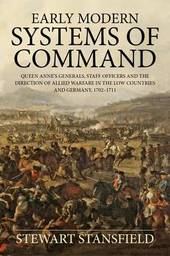
|
Early Modern Systems of Command: Queen Anne's Generals, Staff Officers and the Direction of Allied Warfare in the Low Countries
Hardback
Main Details
| Title |
Early Modern Systems of Command: Queen Anne's Generals, Staff Officers and the Direction of Allied Warfare in the Low Countries
|
| Authors and Contributors |
By (author) Stewart Stansfield
|
| Series | Wolverhampton Military Studies |
|---|
| Physical Properties |
| Format:Hardback | | Pages:304 | | Dimensions(mm): Height 234,Width 156 |
|
| Category/Genre | Military history |
|---|
| ISBN/Barcode |
9781910294475
|
| Classifications | Dewey:940.2526 |
|---|
| Audience | | Professional & Vocational | |
|---|
| Illustrations |
13 colour & b/w illustrations, 2 maps, 9 tables
|
|
Publishing Details |
| Publisher |
Helion & Company
|
| Imprint |
Helion & Company
|
| Publication Date |
23 March 2016 |
| Publication Country |
United Kingdom
|
Description
The Anglophone history of the War of the Spanish Succession (1701-14) in the Low Countries is dominated by military biographies of John Churchill, first Duke of Marlborough (1650-1722), and studies of the battles he fought. Yet while Marlborough exercised a profound influence as a statesman and general-operating as he did in a less flexible paradigm that could emphasise high-level actors at the expense of their subordinates-he did not direct his forces, or liaise with those of his allies, alone. Throughout the conflict, Marlborough was variously aided, abetted and disrupted by a number of general and staff officers. These officers provided the mechanism by which supra-regimental command was effected. While these individuals possessed military dignity according to their rank and station, their real authority in the army was in no small part drawn from the powers and duties delegated to them by the commander-in-chief, or assumed upon their own initiative. Clear chains of command in the modern form did not exist. Such officers functioned not only as vital elements in their own army, but within the broader context of confederate warfare as a whole. They came from diverse backgrounds and possessed varying political affiliations, aspirations and notions of duty. Their careers were governed as much by patronage and preference as any personal merit. A burgeoning sense of military duty was complicated by prejudice, and the boundary between public and private endeavour was indistinct. Some officers gained wealth and financial security in the course of the war; others were ruined by the intrigues and peculations of themselves and others. Early Modern Systems of Command explores the lives these individuals led on campaign and the nature of the apparatus of command they formed. Drawing upon a wealth of primary material-including sources hitherto unstudied-it examines topics as diverse as corruption, logistics, military justice and intelligence-gathering. Investigating not only the degree to which all actors, from the commander-in-chief down to his subordinate officers, were active in the decision-making processes of the campaign, but also the extent to which they contributed to the ongoing process of British and European military development.
Author Biography
Stewart Stansfield has enjoyed a peripatetic academic history. A youthful interest in a career in illustration and graphic design-and a stint in an extreme metal band-was stymied by a more sensible and remunerative move into geology. He completed his undergraduate degree at Manchester before studying for a PhD in volcanology under Steve Sparks at Bristol. His thesis drew upon weeks of fieldwork in Cameroon, Bali and the Aegean, and many hours pouring syrup down a slope in a freezer in Clifton. A second change in vocation followed, with a move from volcanoes into the field of early modern military history. Despite his best efforts, he has not yet been able to combine these disciplines. He read for an MA and a second PhD under John Childs at Leeds, where his research focused on the nature of command, control, communications and intelligence in the War of the Spanish Succession. His second doctoral thesis, adapted for publication here, is his first 'serious' book. He has also spent many years writing for and illustrating a variety of war- and role-playing games, like HeroQuest, with a particular focus on anthropomorphic duck wizards. A Boltonian, the author currently resides in Coppull, Lancashire.
ReviewsOne of the most insightful studies of warfare in the early modern period published in recent years. * Journal of the Society of Army Historical Research *
|